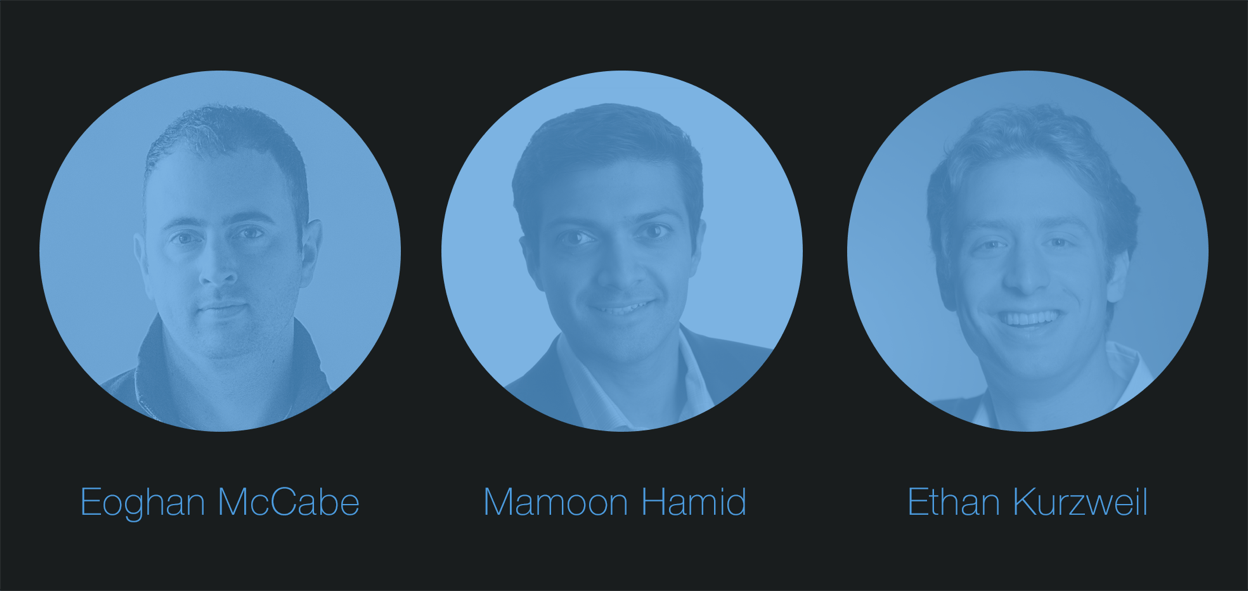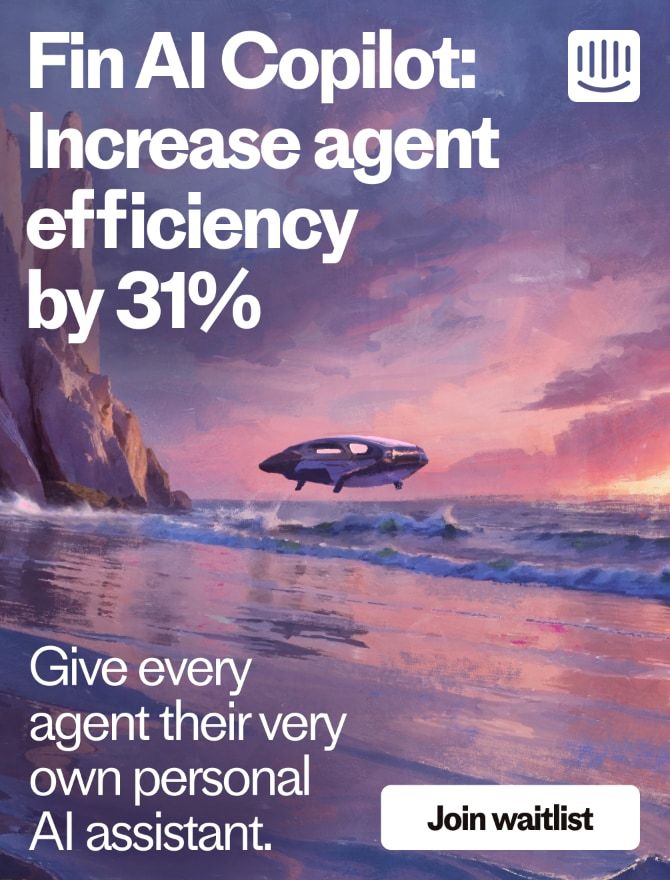
Panel discussion on raising capital
At our recent On Raising Capital event I held a live panel discussion with our CEO, Eoghan McCabe, and our Series A and B investors Mamoon Hamid (SocialCapital) and Ethan Kurzweil (Bessemer Venture Partners).
With several billion dollar investments under their belts, Mamoon (SocialCapital) and Ethan (Bessemer Venture Partners) are two of Silicon Valley’s most experienced investors. The discussion covered a range of topics, including the current landscape of high valuations, the competitive advantages of working outside the Valley, and the insider info VCs can give that nobody else can.
This is the final discussion from our On Raising Capital event. Eoghan also sat down with both investors individually for a chat, and you can listen to those interviews with Mamoon and Ethan for more detail.
If you’d prefer to read rather than listen, here’s a transcript of the conversation, edited for ease of reading.
Kathleen Estreich: We’ve a lot of CEOs and entrepreneurs in the audience, and I think they’d all like to ask you one very important question. How do they get money from you guys?
Mamoon Hamid: You need to find a way to get to us, or find a trusted source that will vouch for you. A lot of investment happens through our networks; the people we know. We also get contacted by entrepreneurs with cold email, and every once in a while we’ll respond.
Ethan Kurzweil: I’d like to turn the question around, because a lot of people think their only goal is to get funded. That might be a goal and an enabler of great things for a company like Intercom, but a company’s real goal should be to solve a big problem and build a good product.
You can’t forget job number one – to build and create a great product. Hopefully the product’s so great that we see it, as was the case with Intercom, and we come chase you down. My advice would be to stop thinking of funding as a be-all and end-all. Think of it as a means to an end.
Build it and they will come

Kathleen: This question is for you, Eoghan. If you’re lucky as an entrepreneur, you get the pick of the litter of investors. What are your criteria for picking investors?
Eoghan McCabe: I’m a big believer in letting people come to you. It’s about focusing on building a great company, and that’s applicable at every single stage. I had to hustle to raise $500K and $1 million in the beginning, but we hadn’t built a great company and a great product at that stage. When you develop those things, the money will come to you.
I’m not saying it’s a walk in a park. There’s always negotiation that needs to happen.
Kathleen: When investors come to you, are you looking for certain values they can bring to help you grow?
Eoghan: I believe this is a self-selecting mechanism. If you rely on the “build it and they will come” strategy, the people who come to you will probably be the right folks for you. When people approach you, you want to test they get your vision, your plan and that they understand the business. There is nothing more thrilling when someone comes to you who can verbalize or tell you your vision. When they understand it better than you do at some point, that’s magical.
Kathleen: Our next question is going to come from Claire McHugh in the audience.
Claire McHugh: Hi, I’m Claire, and I’m the CEO of Axonista. I’d like to know how much time you spend with your companies after investing vs. chasing new companies? What are the types of things you like to work on with those companies?
Mamoon: My time is generally a third spent looking at new companies; a third with existing companies like Intercom; and a third on building the firm, and thinking about where we want to invest in the future.
Ethan: I think 50-50 is about right. I probably spend a little more time with the existing portfolio, given the number of companies I’m involved with. I want to make sure we have the right resources to help Eoghan. I try to be there for the companies, and be available whatever time it is.
The competitive advantage a VC brings
Kathleen: When you guys are spending time with your companies, what are the lessons you keep repeating to the CEOs? What do VCs know that CEOs might not know?
Mamoon: We have 20 SaaS companies in our portfolio, and we can metric any company that walks in compared to Intercom, Slack, or Box at a similar stage. This internal data is our unfair advantage, as that’s the data that startups don’t have. We know at month 12 what 10 different SaaS businesses look like. Most founders don’t have access to that kind of data.
We can share this knowledge. We shared this with Eoghan in the past. We look at all your competitors and how you look in comparison. We take the names out obviously, but it gives a sense of how the company’s doing.
Ethan: It’s a very unusual role as a VC. A lot of times we want to shake the founders and say, “Don’t you see this is not the way it was done before?”. But we have to hold back. We might be wrong, because maybe the founders will do things totally different and break open some new paradigm that we might never predict.
Our job is to enable the founders to do their best work, to support them, and to help make them as successful as they can possibly be. We try to walk a line around how we provide data and advice, but try not to be too prescriptive. We want our founders to be able to surprise us and do magical things.
The value of speaking to your customers

Kathleen: Intercom has been going for four years now. Eoghan, what are some of the biggest mistakes you’ve made?
Eoghan: Wow. Biggest mistakes. One of the things we end up asking ourselves is, “Did we start sales early enough?”. In our case, our VP of Sales, Russ Thau, came to me and said, “I love Intercom. You need sales.” I thanked him, but told him I didn’t agree. We met for months and months, and he eventually convinced me to let him come into the team. Two or three months in, he was producing more and more value. We really saw the benefit of having real humans to talk to our customers, to help them understand and buy the product. It was amazing.
When to look towards the Valley
Kathleen: We’re going to take another question from the audience, from Kevin Holler.
Kevin Holler: Hi, I’m Kevin. I’m the CEO and co-founder of Shake. My question is about geography and location. A lot of startups in Ireland and all over Europe are thinking about Silicon Valley, and how they’re going to get out there. What do you look for in companies thinking about going over there? What stage should they be at?
Mamoon: I think Intercom was at a perfect stage when we first took a look. It was a small team, but there was a product, a vision, and a core founding team that could build and ship product. We also saw early signs of product-market fit. To get all those things, you would probably need to raise some capital locally, in the order of $500K to $1 million, or maybe a little less. Raising your first round of capital from Silicon Valley is probably not the right first step either. I think it’s the second step.
Eoghan: It’s straight up hard when you’ve got no network in Silicon Valley, and you don’t really know how the game works.
Mamoon: You can end up going from conference room to conference room, trying to convince an investor with no one to vouch for you. I think it’s just straight-up impossible. There’s an intermediate step – to bootstrap, or to raise a little capital.
Staying ahead with a global presence

Kathleen: Intercom’s founders are Irish and raised money in Silicon Valley, the company has a big R&D office in Dublin, while business functions out of San Francisco. The war for talent in Silicon Valley has been heating up over the last couple of years. Are we seeing a new trend where companies are going to have different offices all around the world?
Ethan: I really hope so, because San Francisco will explode if it continues at the pace it’s been going at! It comes down to working with what you’ve got, a competitive advantage that allows you to move faster. There’s no question in my mind that Intercom’s presence in Dublin is central to their ability to stay ahead, and to innovate at the velocity with which they can produce great product.
There’s no magic to Silicon Valley. There are certainly experienced technical folks and business leaders in Silicon Valley who’ve built companies like Intercom before, but you can do that in any location. Silicon Valley doesn’t have a monopoly on innovation or good startups.
Kathleen: There are a lot of towns and cities that tried to replicate Silicon Valley. Why do you think they’ve struggled?
Ethan: The reasons are rooted in the DNA of Silicon Valley. It has a culture of risk-taking and entrepreneurship, with enabling structures that you can build around technical talent. There are many decades of that built up out there, so you’ll continue to see disruptive companies like Facebook and Google exist in Silicon Valley.
That doesn’t mean no other place could ever have great talent and great startups. As the world becomes smaller, and good tools like Intercom allow people to share knowledge more quickly, you’ll see other places develop little pockets of talent.
Mamoon: I would say half of our companies have a significant presence outside of Silicon Valley, where they’re building real product and have significant resources deployed. Probably half of our companies have a primary presence in Silicon Valley, with a secondary presence or even a semi-primary presence elsewhere.
It’s a true competitive advantage for Intercom to be in Ireland. I don’t think we’d be where we are if it wasn’t for our Dublin team.
Nurturing a culture across time zones
Kathleen: It’s a key differentiator for Intercom to have their R&D office in Dublin. But there are some trade-offs. Eoghan, can you speak to that?
Eoghan: The time zone difference is the obvious one; eight hours is rough. When I start checking my mail in the morning, people in Dublin are finishing work. That’s not useful. It’s really difficult to stay in sync. We try to counter that by not dividing teams across offices. The whole product team and the whole engineering team are in Dublin. The finance, growth, and marketing teams are all in San Francisco, for the most part. This cuts down the amount of communication required.
The other trade-off is keeping people together as an organization with a singular mission, while building a wholesome culture. How do you do that when you’ve got a large group of people who never see each other? When you don’t see people, you forget they exist and you forget all the types of projects, hard work, and hustle that goes on. That’s really difficult. With all of these trade-offs, you need to try to make use of your strengths, and find the silver lining in each of those things.
For example, we celebrate the fact we’re from two cities and two countries. It’s amazing to see Americans in San Francisco talk about going for “scoops” on Friday after work. That’s a real thing! They’re excited about the Irish thing, just as in Dublin, people are excited to work with a Valley company. All of our Dublin offices and meeting rooms are marked with signs from San Francisco neighbourhoods, which is cool too.
I think you need to ask yourself if the trade-offs are worth it. Over time, it’s become clear it’s been very much worth it.
The danger in chasing false signals

Kathleen: We’re going to take another audience question, from Don Moynihan of GE Capital Treasury
Don Moynihan: My question is about valuation. Notwithstanding the recent pop in China, we’ve been in a fairly benign macro environment, with low interest rates and ample liquidity. Given that environment, can I get your comments on where you see valuations at the moment, and whether you think they’re reasonable or stretched?
Ethan: Valuations are high, there’s no question there. I think it has perhaps bred a culture of investors that are chasing unicorns or other multi-headed beasts that may, or may not, really exist in the wild.
The repercussions are entirely predictable. People tend to chase false signals of what success is, and chase the next $100 million funding round, or $1 billion valuation. A lot of the time these things tend to be very illusory.
The right way to succeed is to build the best product and company you can, control your own destiny, and not rely on all of this macro stuff to win.
It’s much easier said than done. If you look over time, through any macro climate, great companies have been started. Facebook started in 2004, and Skype started in 2003, some of the worst years for funding. Good companies and great entrepreneurs will find a way.
Knowing when to be capital efficient
Kathleen: Eoghan, a lot of companies are getting crazy valuations. They seem to be ahead of where their actual numbers may or may not be. When you think about raising money, how do you think about valuation?
Eoghan: The question of valuation is not unrelated to the question of round size. More money means more optionality. You can certainly do more things, or you can do the same amount of things and have spare money. At least that’s the little lie that founders and CEOs tell themselves anyway.
I would agree with our investors here that it would be almost impossible to give any human or CEO $50-100 million, and for them not to spend money faster. People spend money they have. It’s no different for companies than it is for individuals.
When you spend faster you have a higher momentum, and it’s a train that’s far more difficult to slow down. That gets especially worrying when you spend on things that are not accretive to the company, that have not created any value.
Valuation is not the be-all-and-end-all. I believe in working with great people, but the primary commentary on this whole market comes from VCs. There’s a vested interest there. My stand is to raise as much money as possible, and somehow don’t spend it all.
Kathleen: So higher valuation is always better in your mind?
Eoghan: To me, higher valuation means more money. If you can somehow remain unique, by actually not spending all your money and putting some away for a rainy day, then that’s a big thing.
Mamoon: It’s not always better. You lose optionality as well. Say if a company raises $50 million on a $500 million valuation, two years later they might still not be worth $500 million. At this point, traditionally, if they had raised $5 million on a $50 million valuation, they would have gotten acquired by Google for $150 million. That’s not an option anymore, because they’re sitting on a really high valuation. So higher valuations are not always a good thing.
Eoghan: That becomes a problem if they go and spend that $50 million. If they raised $50 million, but only spent as if they’d raised $4 million, they’d have a lot of money left in the bank. That money is probably going to at least be worth to the potential acquirer what the money was worth to the investors. It also depends on the terms that you raised that money on.
Ethan: How do you not spend it?
Eoghan: Every single dollar you spend should be accretive to the value of the company. That question needs to be looked at through the lens of where we spend the money.
If we’re spending on product, we ask ourselves – does the market want this? Can we sell more of this product? Is it going to create a larger market for us? If we’re spending on marketing, do the economics make sense such that the dollar I spend here will work out to three or four dollars later? If we’re spending on sales people, the same, applies. That’s how you don’t spend too much.
Of course, some people do that and they don’t raise a lot of money. It turns out they just made bad decisions.
Ethan: Thanks for humoring me. One of the things that appeals to us about Intercom in particular is how capital efficient you were historically, and how well you’d operated the business. It gave us comfort in terms of financing, and what you would do with that capital.
Eoghan: You’re right. I’ve been proud that we don’t do the Valley bullshit stuff. We just don’t. We don’t spend stupid money.
Software and the Internet are Only Getting Started
Kathleen: We’ve got one final question for everyone. We talked about valuations being high, with lots of money coming in. There may or may not be a market correction sometime in the future. But I think we’re all pretty bullish on technology and its future. What are you most optimistic about in the next 5 to 10 years?
Mamoon: Technology is relevant in every aspect of how we live today, and is disrupting one industry after the other. There’s so much to be excited about, just in terms of how much value will be created. It will be trillions of dollars, and we’re still at such an early stage. It’s been 20 years of the internet, and it will be 20 years of mobile, and then 20 years of something else. It’s going to rip through all parts of society from healthcare and transportation, to education and financial services.
Thirty years from now I think we’ll be looking at companies that will all be technology businesses. It’s incumbent on us now to figure out where we want to invest our time, especially in companies like Intercom who help web and mobile businesses interact with their customers more personally.
Ethan: Two areas are becoming information technologies. The first is healthcare, using technology to improve our bodies and our health. The other area is some form of virtual reality in the shape of an immersive experience, a new social way to share online. People have been predicting this for a while. The idea of being able to pop on some glasses and be in Dublin while in San Francisco is probably very appealing to Eoghan, in terms of working with remote teams. It’s certainly coming, and I think it will fundamentally change how the human species interact.
Eoghan: As a product person and a software person, it might sound negative, but 99% of software is shit. Like really shit. Most people in the world don’t have the benefit of good software. For verticals like farming, no one is making software for them.
Right now we have technologists making software for technologists. But there are a lot more people in the world who need good software. But even if you look at the software that exists today, it’s shitty. I mean, it just is. It’s hard to build software right now because we’re held back in different ways – whether it’s talent, the technologies we have, or the platforms. Even platforms like iOS are hard to develop for.
It is getting easier though. More and more people are studying computer engineering and computer science. There will be more people using better platforms and technologies. We’re still learning about software and we’re learning about the internet. The internet is still a baby, so we’re learning how to make better products. What I’m excited about are opportunities to make better software for more people. Opportunities abound, and the whole world needs better software.







